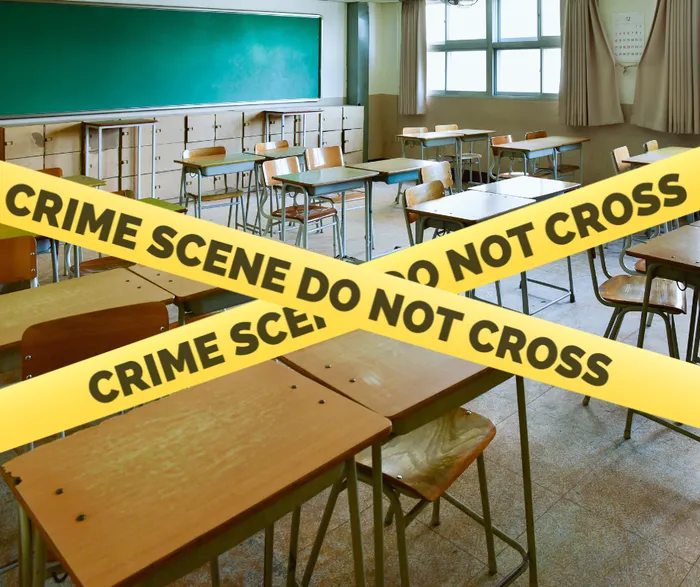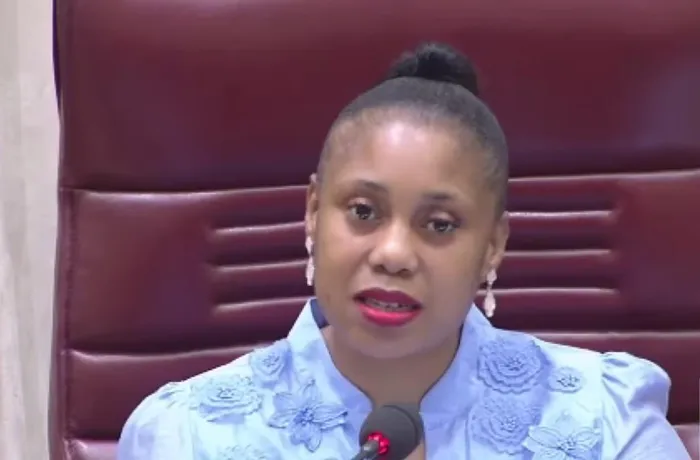
THE parliamentary portfolio committee on basic education is disturbed by the rising number of teachers who are accused of sexually assaulting learners.
Image: IOL Graphics

CHAIRPERSON of the parliamentary portfolio committee on basic education, Khomotjo Maimela, said the issue of statutory rape of learners speaks directly to constitutional and moral duty to protect every learner's right to safety, dignity and education.
Image: YouTube Screengrab
KwaZulu-Natal's education system has been shaken by a new parliamentary report revealing a disturbing rise in serious misconduct cases involving teachers, including 30 allegations of statutory rape and several cases involving the sexual assault of young learners.
The findings were presented to the parliamentary portfolio committee on basic education this week by the KZN Department of Education's Deputy Director for Corporate Affairs, Advocate Bheki Masuku, who painted a troubling picture of learners being violated by those entrusted with their safety and care.
Masuku said the department had recorded 71 misconduct cases against teachers this year.
Some of the most serious involve allegations of rape, including instances said to have occurred within school premises.
One case cited in the report involves an 11-year-old Grade 5 learner who was allegedly assaulted in a manner "too brutal to detail publicly". In another case, a teacher is accused of supplying alcohol to a learner before sexually assaulting her.
Masuku told the committee that once cases are reported, the department conducts immediate investigations and suspends implicated teachers pending the outcome of disciplinary processes.
He warned, however, that the system often struggles to respond quickly because some learners fear reporting incidents, while some schools prioritise protecting their image over reporting to authorities.
"Some schools simply focus on teaching. Others worry about the reputation of the school. And in some cases, schools refer matters to parents because they believe the parents should open cases," Masuku said.
Organised labour appearing before the committee raised concerns about the absence of clear reporting channels and the lack of training for educators dealing with sensitive situations, particularly cases involving pregnant learners or learners who may have been sexually abused.
Several union representatives argued that every school should have a dedicated social worker, saying the emotional and psychological trauma learners experience requires specialised support.
But Minister of Basic Education Siviwe Gwarube cautioned that while the proposal was great, it was not currently feasible. Social workers, she explained, are placed at district level and serve multiple schools.
Gwarube told MPs that the BELA Bill now provides clearer guidance by allowing teachers to report pregnancies involving learners under the age of 16 so that authorities can investigate whether statutory rape has occurred.
The reports of alleged abuse have added pressure on the department to strengthen safeguarding measures in schools, amid calls from unions and civil society for tighter monitoring of educators and stronger accountability systems.
This week was a busy one for the portfolio committee as it held the statutory rape inquiry stakeholder engagement, which was attended by Gwarube, representatives from Basic Education, the Department of Social Development, School Governing Body Associations, Principal Associations, learner representative organisations, the South African Council of Educators (SACE), leaders from faith-based organisations and traditional leaders.
The chairperson of the committee, Khomotjo Maimela, said the inquiry was instructed by the Speaker's office, and four other portfolio committees will hold their own with their stakeholders. The portfolio committee on women, youth, and people living with disabilities was the leading committee on the matter, and the committees of higher education, justice, and the police will follow suit.
"Despite the elaborate legal clarity of what constitutes statutory rape, our country continues to face a distressing rise in cases where young learners, some as young as 10 or 12 years old, become victims of sexual violation and coercive relationships with older men, peers or even individuals in positions of trust.
"This problem is multi-faceted. It cuts across social, economic and cultural lines. It is reflecting deep-rooted structural inequalities and moral failures in our society. As analyses from recent departmental and civil society presentations indicate that statutory rape is not an isolated legal offence but a symptom of systematic poverty, gender inequality and cultural silence. These conditions perpetuate environments where abuse is normalised and our victims are silenced," said Maimela.
Maimela said data from the Department of Social Development shows that Eastern Cape alone reported over 1100 sexual abuse cases in the 2024/2025 financial year, with districts like Nelson Mandela Bay and OR Tambo recording the highest prevalences.
"Across Gauteng, similar patterns are emerging. The Department of Health recorded over 100 000 adolescent deliveries between 2020 and 2025. A figure that masks the true scale of statutory rape since many of these pregnancies result from exploitative relationships. Yet behind these statistics lie lived realities; they are children whose lives are irreversibly altered. Many drop out of schools, suffer stigma and trauma, or are forced into early motherhood. Others remain invisible, their abuse never reported, their pain never acknowledged.
"As the committee we cannot ignore this reality. It speaks directly to our constitutional and moral duty to protect every learner's right to safety, dignity and education."
Maimela said there are issues of financial dependency and fear of reprisal from the community that deter victims from reporting the abuse, which is something that needs awareness and moral leadership. She also pointed out structural shortcomings, particularly in rural and under-resourced areas.
SUNDAY TRIBUNE